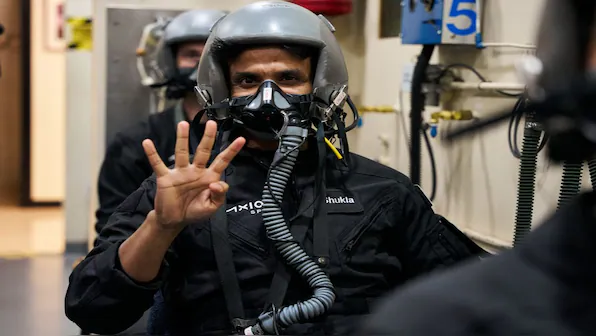India’s Space Renaissance: Shubhanshu Shukla Becomes First Indian on ISS, Speaks with PM Modi
- MGMMTeam

- Jul 1, 2025
- 4 min read
In a landmark achievement that has rekindled India’s human spaceflight aspirations, Group Captain Shubhanshu Shukla, an Indian Air Force pilot and trained astronaut, made history by becoming the first Indian to reach the International Space Station (ISS). His journey aboard Axiom Mission 4 (Ax‑4) marks India’s return to crewed space missions after more than four decades. This momentous occasion was further highlighted by a heartfelt video call from Prime Minister Narendra Modi, who lauded Shukla's achievement as a national milestone.

A Historic Journey to the ISS
Shubhanshu Shukla blasted off from NASA’s Kennedy Space Center in Florida aboard SpaceX’s Dragon capsule, aptly named "Grace", on June 25, 2025. The mission, operated by Axiom Space, included astronauts from India, Poland, and Turkey, and was commanded by NASA veteran Peggy Whitson. This commercial mission signifies the growing global collaboration in space exploration, and for India, it represents a leap into a new era of participation in international orbital missions.
After a successful 36-hour journey, the Dragon capsule docked with the ISS on June 27. The docking was achieved with precision as the capsule made a soft capture over the Atlantic Ocean at 4:01 pm IST, followed by hard capture and hatch opening. Shukla's arrival at the ISS marked the first Indian presence on the station, distinguishing him as a pioneer in India’s expanding space legacy.
PM Modi’s Call from Earth to Orbit
To honor this moment, Prime Minister Modi held a live video call with Shukla, which was widely broadcast and celebrated across India. In the conversation, Modiji expressed immense pride and referred to Shukla as “the furthest from India, but the closest to the hearts of 140 crore Indians.” The Prime Minister emphasized the symbolic value of the mission, calling it the dawn of a new chapter for India’s space journey.
Shukla shared his profound experience of viewing Earth from space, noting that borders disappear when one looks down from orbit. “It feels like one home,” he said. He also reflected on how the Indian subcontinent appears far grander from space than on any map. The Prime Minister praised this perspective, highlighting how space travel unites humanity and inspires a deeper understanding of our shared existence.
Science in Space: India’s Microgravity Research Breakthroughs
Beyond symbolic value, Shukla’s mission is rooted in science. During his 14-day stay aboard the ISS, he is leading seven Indian-designed microgravity experiments. These studies span several critical fields including stem cell research, muscle atrophy, and nutrient production.
One of the key experiments involves observing muscle stem cell behavior in zero gravity to understand how the human body adapts without the pull of Earth. This has major implications not only for long-duration space missions but also for treatments of degenerative muscle conditions on Earth. Another project examines how the human digestive process is affected by microgravity, a topic Shukla has presented in a demonstration video aimed at educating Indian students.
A particularly innovative project focuses on cultivating cyanobacteria—photosynthetic organisms capable of producing nutrients—in microgravity. This research could revolutionize food systems both for space habitats and on Earth, offering sustainable nutrition solutions in resource-scarce environments.
Challenges and Adaptation in Zero Gravity
Shukla also spoke candidly about the physical and psychological challenges of adjusting to life in orbit. Initially, he experienced headaches and lightheadedness, symptoms of what astronauts describe as “space adaptation syndrome.” These effects occur due to fluid redistribution in the body when Earth’s gravity is removed.
Adapting to a floating existence required him to tether his legs during the video call with PM Modi to stay in place. He humorously compared the process to “becoming a baby again”—learning how to move, sleep, and function all over again in a new environment. Despite these challenges, he maintained a positive tone, emphasizing that Indian astronauts are fully prepared to thrive in space.
A Taste of India in Orbit
Adding a touch of cultural delight to the mission, Shukla revealed that he brought traditional Indian desserts such as gajar ka halwa, moong dal halwa, and aam ras aboard the ISS. These sweet treats were not only enjoyed by Shukla but were also shared with international crewmates, showcasing India’s culinary richness in the realm of international space travel.
PM Modi, amused and pleased, said this reflects the soft power of India—where even in the most advanced technological environments, cultural roots are not forgotten.
India’s Space Future: From Gaganyaan to a National Station
The Ax‑4 mission is not a standalone event but part of a larger vision. Shukla’s mission is expected to directly benefit ISRO’s upcoming Gaganyaan-4 crewed mission, slated for 2027. India’s human spaceflight program is gathering momentum with goals of building a national space station in low Earth orbit by the early 2030s.
Moreover, India's partnership with Axiom Space and emerging private players like Skyroot Aerospace is opening commercial opportunities that will democratize space access. These collaborations point toward a future where India is not just a participant, but a leader in global space exploration.
Conclusion: A New Orbit for India
Shubhanshu Shukla’s mission is more than a personal milestone—it is a national symbol of ambition, unity, and scientific advancement. As he orbits Earth aboard the ISS, he carries the dreams of 1.4 billion Indians and the torch of a renewed space program.
Prime Minister Modi's words resonate across the nation: “Today’s children don’t just look at the sky—they believe they can reach it.” With this successful mission, India has taken a giant leap closer to that dream. Shukla’s achievement is not only history in the making—it is the foundation of India’s future among the stars.
(Sources: Firstpost, Hindustan Times, India Today)




Comments